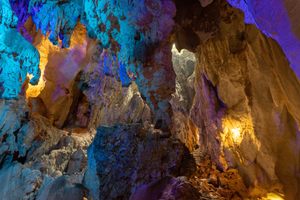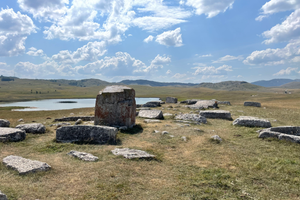It isn’t uncommon to stumble upon a subterranean shrine in Laos’s “Cave Alley.” Since the 16th century, these natural pits in the mountains of Khammouane province have served as places of worship, often bedecked with prayer flags, floral garlands, and gold-plated Buddha statues with offerings of bottled water and plates of food at their feet. Elephant Cave has all of the above and then some.
As its name suggests, elephants are objects of prayer and decor at this cave about four miles outside the provincial capital of Thakhek. Two large statues depicting the animals in full regalia frame a passageway to the stairs leading up to the cave’s large entrance, looking out over the lush landscape of central Laos. Within its limestone walls are more mythological statues of the animal, one of them standing on two legs like a human, as well as other sacred figures surrounded by bouquets of incense, candles, and colorful trinkets.
In Laotian culture, the elephant is a symbol of strength and prosperity. It’s the national animal of Laos and a figure of enlightenment, derived from Theravada Buddhism, the country’s dominant religion.



